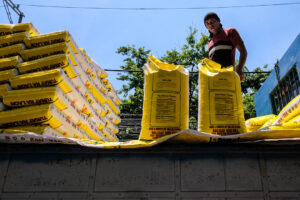NATIONAL ECONOMIC and Development Authority (NEDA) Secretary Arsenio M. Balisacan on Monday defended the government’s decision to slash tariffs on rice until 2028, saying this would reduce the impact of elevated global rice prices on Filipino consumers.
“If you reduce the tariff… that will dampen the effects of world rice price increases on our local markets,” he told reporters.
The NEDA Board, chaired by President Ferdinand R. Marcos, Jr., last week approved the new Comprehensive Tariff Program which reduced tariffs on certain agricultural and industrial imports until 2028. Tariffs on rice imports were cut to 15% from 35%.
Mr. Balisacan, who is facing calls to resign from some agriculture groups, said in a separate statement that the NEDA Board as a collegial body made the decision, “recognizing its strategic importance in ensuring access and affordability to essential commodities — while balancing the interests of consumers, local producers and the economy.”
“The goal of the NEDA Board in reducing the tariff rate of rice is to ensure that Filipinos have access to nutritious and affordable food, particularly rice, while managing inflation and sustaining our economic growth momentum,” he said, noting that rice contributed about two percentage points to inflation in the past three months.
Inflation quickened to 3.9% in May, the fourth straight month of faster inflation. However, rice inflation eased for the second consecutive month to 23% in May from 23.9% a month earlier.
“Reducing rice tariffs is expected to bring down rice prices for consumers while supporting domestic production through tariff cover and increased budgetary support to improve agricultural productivity, especially as global rice prices remain elevated,” Mr. Balisacan added.
Global rice prices have soared since last year due to India’s ongoing ban on exports of non-basmati rice.
The Philippines, the world’s top importer of rice, has been affected by the spike in global rice prices. It imports rice mainly from Vietnam and Thailand.
However, Mr. Balisacan said the outlook for a decline in global rice prices is still uncertain, citing the impact of the El Niño dry spell and the looming La Niña weather pattern on agricultural production.
“If the forecasters, the futures market are correct, then we should see the tapering of this price increases soon, by around September. So, by then, you will feel the domestic prices stabilize,” he said in mixed English and Filipino.
Thai rice prices have increased by 6% to $628 per metric ton (MT) as of end-May from $592 per MT as of end-April, according to the World Bank Commodities Price Data. Meanwhile, Vietnamese rice prices dipped to $568 per MT as of end-May from $571.5 per MT in April.
With the tariff cuts, the NEDA chief hopes that rice inflation would ease near the level of inflation.
However, Mr. Balisacan said it is “hard to say” if it can be achieved this year “because it depends so much on what the world market…will be like in the next six months.”
“As of now, the best data that I saw until December of 2024 is that it comes down [from] the level today a bit. But then, it will stabilize there. It will not come down to the level of 2023. So, that is the challenge,” he added.
The Department of Agriculture (DA) last week said it expects the rice import tariffs to bring down average retail prices by P6-7 per kilo by July or August.
The DA’s latest price watch showed that the price of imported regular milled and well milled rice stood at P49.92 a kilo and P52.98 a kilo, respectively.
The NEDA chief reiterated that raising productivity in the domestic agriculture sector remains the government’s top priority.
“If we have started addressing these issues of the agricultural sector many years ago, then we should have not been in this situation now.”
On calls for his resignation, Mr. Balisacan said he serves at the pleasure of the President.
“If the President finds a better person to run NEDA, I’ll be happy to accept that,” he said. — BMDC
